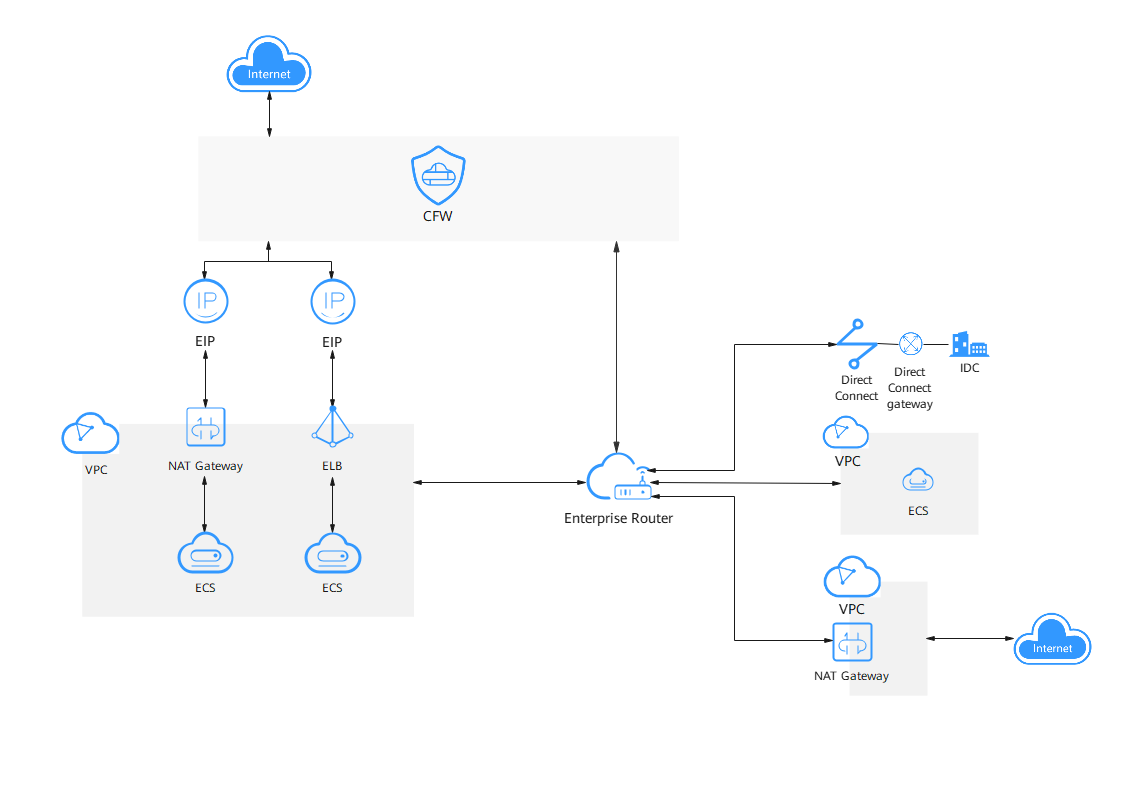What Is CFW?
Cloud Firewall (CFW) is a next-generation cloud-native firewall. It protects the Internet border and VPC border on the cloud by real-time intrusion detection and prevention, global unified access control, full traffic analysis, log audit, and tracing. It employs AI for intelligent defense, and can be elastically scaled to meet changing business needs, helping you easily handle security threats. CFW is a basic service that provides network security protection for user services on the cloud.
- Internet border: The border between cloud assets and the Internet. It controls the inbound (from the Internet to the cloud) and outbound (from the cloud to the Internet) traffic.
- VPC border: The border between a VPC and an on-premises integrated data center (IDC), or between two VPCs. It controls internal service access.
CFW Tutorial
Positioning

Intelligent Defense
CFW has integrated Huawei Cloud security capabilities and Huawei network threat intelligence. Its AI intrusion prevention engine can detect and block malicious traffic in real time. It works with other security services globally to defend against Trojans, worms, injection attacks, vulnerabilities, and phishing attacks.
High Scalability
CFW can implement refined control on all traffic, including Internet border and cross-VPC traffic, to prevent external intrusions, internal penetration attacks, and unauthorized access from internal to external networks. Its bandwidth, number of EIPs, and number of security policies can be increased without limit. Its cluster is deployed in HA mode to protect your workloads under heavy traffic.
Easy-to-Use Application
As a cloud-native firewall, CFW can be enabled easily, import multi-engine security policies with a few clicks, automatically check assets within seconds, and provide a UI for performing operations, greatly improving management and defense efficiency.
Protected Objects
|
Protection Type |
Protected Object |
Reference |
|---|---|---|
|
Internet border |
Elastic IPs (EIPs). The Elastic Cloud Servers (ECSs), NAT gateways, Elastic Load Balance (ELB), or other resources that are bound to EIPs can be protected. |
|
|
VPC border |
Virtual Private Clouds (VPCs), Virtual Gateways (VGWs), Virtual Private Networks (VPNs), or other cloud resources that are bound to enterprise routers. |
Supported Access Control Policies
- Access control based on the 5-tuple (source IP address, source port, destination IP address, destination port, and protocol)
- Access control based on the domain name
- Access control based on the intrusion prevention system (IPS). The IPS works in observation or interception mode. In block mode, CFW detects and blocks traffic that matches the IPS rules.
- ACL access control policies set for IP address groups, blacklists, and whitelists
References
For details about CFW billing, see Billing Overview. For details about the price, see CFW Pricing Details.
For details about how to use CFW, see Getting Started.
Feedback
Was this page helpful?
Provide feedbackThank you very much for your feedback. We will continue working to improve the documentation.See the reply and handling status in My Cloud VOC.
For any further questions, feel free to contact us through the chatbot.
Chatbot





